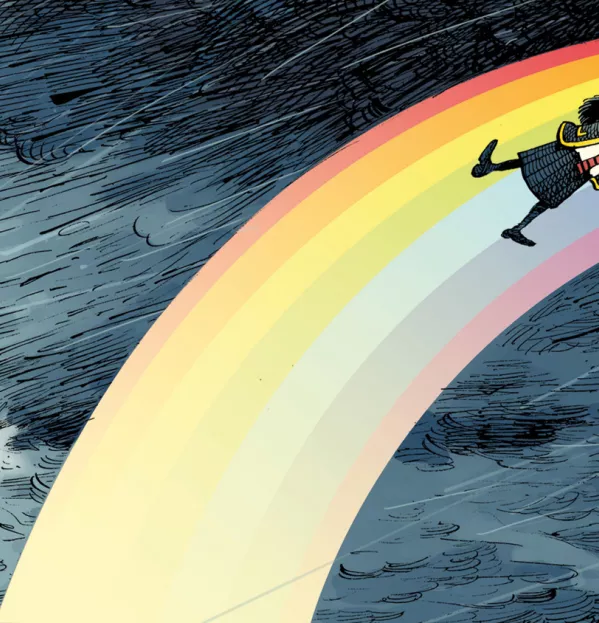The curriculum needs to go back to the future

We are caught between an ill-fitting curriculum and an unpredictable future. The perfect educational storm. Policymakers are weathering it by riding a new wave of logical positivism.
A movement that was highly influential in the first half of the 20th century, logical positivism claims that only that which can be empirically verified is meaningful. Sound familiar? A hundred years later, we’re back there again.
Schools are still dealing with the repercussions of Michael Gove’s “core knowledge curriculum plan” (bit.ly/GoveCore). Now that his plan is realised, value is really only placed on a very narrow and measurable curriculum.
While we should all celebrate a renewed emphasis on getting young people into science, we are currently making the mistake of equating science with the strictly quantitative. We are forgetting the imaginative, creative, holistic and open-minded approach needed in education to nurture excellent science - and many other vital disciplines.
The current approach to the curriculum is reductionist. We need to open up and diversify what and how we teach.
Where do we see this reductive approach? In lists of “facilitating” (read “acceptable”) A level subjects, in performance measures such as Progress 8 and EBacc - and a “fact-only” Gradgrindian approach to learning by rote, rather than freeing the mind.
We need free minds that can wonder, speculate, imagine, solve and cure. Our current fettling and fact-fêting approach is extending to tests of how well Year 4 students’ can remember their times tables. While I have nothing against times tables, ministers urgently need to raise their eyes towards the horizon.
This is a moment of choice: to default to factory settings and reproduce a fiction pedalled by Michael Gove, or to design something new that may have a hope of preparing Generation Z for the future challenges of alternative facts, resource scarcity and an AI-led workforce.
We have stripped down the curriculum at the cost of that which we most need: creativity, imagination and the ability to think critically.
Students will enter a society where there will be no single accepted source of authority. The torrent of information that they come into contact with on a daily basis will need to be filtered if they are to make sense of the world.
It is excellent that mathematical ability is being championed by those in Whitehall, but maths alone will not futureproof children’s education. Doesn’t it seem ridiculous to think this when considering the role of AI in society in 2028, which is when our times tablers will graduate? Mathematical ability combined with critical skills, a fertile imagination, resilience, problem solving and intellectual risk-taking are the attributes which are more likely to stand children in good stead.
Just like the firefighters in Ray Bradbury’s Fahrenheit 451, who benefited from books only to set about burning the books of the next generation, there seems to be a lack of responsibility in policymakers denying post-millennials the kind of fit-for-purpose education that they profited from.
The ladders are being hauled up behind those who got most from the grammar school ideal. Resourcing in schools for music, the arts and humanities has rapidly diminished. Their extrinsic value is no longer recognised by the authorities that hold schools to account.
Reports that previously treasured subjects can no longer survive (bit.ly/LatinState), that a lack of moral and religious education is leaving students at risk (bit.ly/RERisk) and that creativity in schools is suffering (bit.ly/CreatePrivate) will become as commonplace as the reports of closing pubs across the British countryside.
It is imperative that our new education minister acts to restore the imaginative, the critical and the creative in our schools. He should do this through revising destructive policies that do not safeguard current pupils’ places in the workforce of the next few decades.
Imagination and courage
Education should equip, not prescribe. It is arrogance to suggest that a fact-based curriculum that works relatively well for some within the current paradigm will be that which works well for the next generation.
Slowly, we are waking up to the need for a new model of education. And there are precedents for policymakers exercising imagination and courage in the face of an increasingly volatile world.
The 1918 Education Act comes across as almost impossibly modern in thinking about the purpose of education. It had the goal of education as enlightened freedom - and the stimulation of civic spirit. This came at a time of global flux: a workforce transformed by the effects of war, universal suffrage and the threats considered implicit in the Russian revolution and social upheaval at home.
In the later 20th century, education had to respond to the crises of world war, loss and displacement. It did this by becoming progressive, radical and making compulsory subjects that helped students understand and respond to the human condition.
We need to get back to these progressive and radical ideals in education if we wish to equip students for the future, not to give into a reactionary and lazy impulse to a retrograde model of education which is not fit-for purpose.
Now, more than ever, we need to rekindle the progressive spirit of the 1918 Education Act and create curricula that will enable post-millennials to face the storm well-prepared, well-equipped and with optimism for brighter times ahead.
Alice McNeill is teacher of philosophy and religious studies and head of partnerships at Bedales School, Hampshire
You need a Tes subscription to read this article
Subscribe now to read this article and get other subscriber-only content:
- Unlimited access to all Tes magazine content
- Exclusive subscriber-only stories
- Award-winning email newsletters
Already a subscriber? Log in
You need a subscription to read this article
Subscribe now to read this article and get other subscriber-only content, including:
- Unlimited access to all Tes magazine content
- Exclusive subscriber-only stories
- Award-winning email newsletters